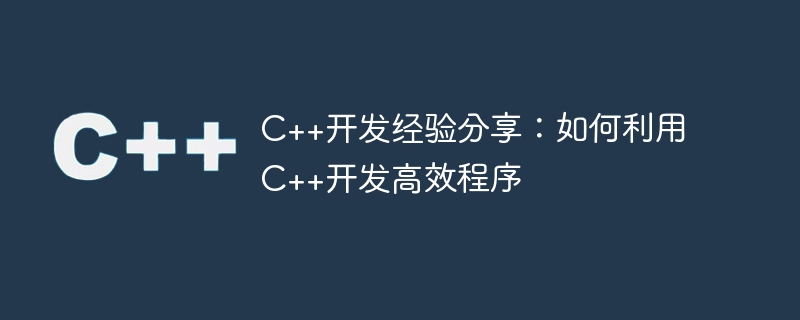Home >Backend Development >C++ >C++ development experience sharing: How to use C++ to develop efficient programs
C++ development experience sharing: How to use C++ to develop efficient programs
- WBOYWBOYWBOYWBOYWBOYWBOYWBOYWBOYWBOYWBOYWBOYWBOYWBOriginal
- 2023-11-22 12:41:12955browse

C Development experience sharing: How to use C to develop efficient programs
With the rapid development of technology, the software development industry is also constantly growing and innovating. As a widely used programming language, C has been widely used in various industries due to its efficiency and flexibility. So, how to use C for efficient program development? In this article, we will share some C development experiences and techniques to help readers better use C to develop efficient programs.
- Streamlined code structure
As an object-oriented programming language, C’s code structure needs to have a clear hierarchy and logic. In order to develop efficient programs, we need to streamline the code structure and avoid redundant code and complex logic. Try to adopt object-oriented design ideas and decompose the program into multiple modules to make the code structure clear and easy to maintain. - Using the standard library
C’s standard library provides a wealth of functions and tools, including containers, algorithms, input and output, etc. Proper use of the standard library can improve program efficiency and performance. For example, using the containers provided by the standard library can easily manage data structures, and using the algorithms provided by the standard library can simplify code and improve program running efficiency. - Reasonable selection of data structures and algorithms
In the C development process, reasonable selection of data structures and algorithms is crucial. Different data structures and algorithms have different characteristics and applicable scenarios. Choosing appropriate data structures and algorithms can optimize program performance. For example, for scenarios that require efficient search, you can choose to use data structures such as hash tables or red-black trees; for scenarios that require sorting, you can choose to use algorithms such as quick sort or merge sort. - Memory Management
Memory management in C is an important task. Reasonable memory management can reduce the memory footprint of the program and improve the execution efficiency of the program. In C, we can use smart pointers to manage dynamic memory to avoid memory leaks; at the same time, regularly releasing unnecessary memory can avoid the generation of memory fragmentation, thereby improving program performance. - Multi-threaded programming
In today's software development, multi-threaded programming has become a common technology. C provides a wealth of multi-thread libraries and tools to easily implement multi-thread programming. Reasonable use of multi-threading can improve the concurrency and response speed of the program, thereby improving the efficiency and performance of the program. - Use performance analysis tools
In the process of developing efficient programs, using performance analysis tools is an effective method. Performance analysis tools can help developers find bottlenecks and optimization points in program performance, and then optimize and adjust the program in a targeted manner.
To sum up, C, as an efficient programming language, has a wide range of applications. By streamlining the code structure, using standard libraries, rationally selecting data structures and algorithms, rationally managing memory, rationally using multi-threaded programming, and using performance analysis tools, we can better utilize C to develop efficient programs. I hope that the sharing of this article can help readers better use C for efficient program development and improve program performance and efficiency.
The above is the detailed content of C++ development experience sharing: How to use C++ to develop efficient programs. For more information, please follow other related articles on the PHP Chinese website!

